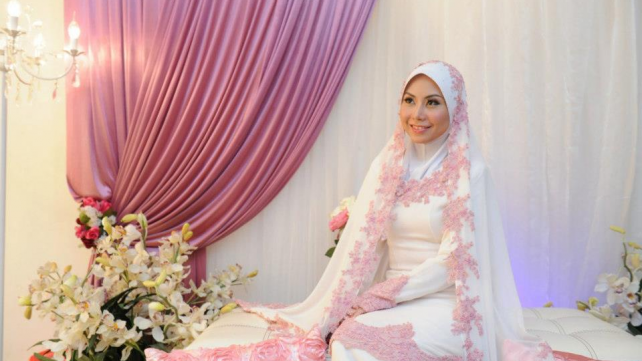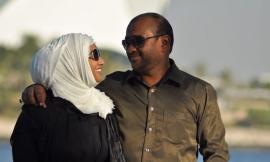
Quran and Hadith about marriage. What does Nikah mean and what does it take to enter into a marriage agreement in Islam? It is a strong contract or covenant (mithaqun Ghalithun) as expressed in Quran 4:21.
Mutual Agreement of Bride and Groom
Marriage (nikah) is a solemn and sacred social contract between bride and groom. This contract is a strong covenant (mithaqun ghalithun) as expressed in Quran 4:21. The marriage contract in Islam is not a sacrament. It is revocable.
Both parties mutually agree and enter into this contract. Both bride and groom have the liberty to define various terms and conditions of their liking and make them a part of this contract.
Mahr
The marriage-gift (Mahr) is a divine injunction. The giving of mahr to the bride by the groom is an essential part of the contract.
'And give the women (on marriage) their mahr as a (nikah) free gift" (Quran 4:4)
Mahr is a token commitment of the husband's responsibility and may be paid in cash, property or movable objects to the bride herself. The amount of mahr is not legally specified, however, moderation according to the existing social norm is recommended. The mahr may be paid immediately to the bride at the time of marriage, or deferred to a later date, or a combination of both. The deferred mahr however, falls due in case of death or divorce.
One matrimonial party expresses 'ijab" willing consent to enter into marriage and the other party expresses 'qubul" acceptance of the responsibility in the assembly of marriage ceremony. The contract is written and signed by the bride and the groom and their two respective witnesses. This written marriage contract ("Aqd-Nikah) is then announced publicly.
Sermon
The assembly of nikah is addressed with a marriage sermon (khutba-tun-nikah) by the Muslim officiating the marriage. In marriage societies, customarily, a state appointed Muslim judge (Qadi) officiates the nikah ceremony and keeps the record of the marriage contract. However any trust worthy practicing Muslim can conduct the nikah ceremony, as Islam does not advocate priesthood. The documents of marriage contract/certificate are filed with the mosque (masjid) and local government for record.
Prophet Muhammad (S) made it his tradition (sunnah) to have marriage sermon delivered in the assembly to solemnize the marriage. The sermon invites the bride and the groom, as well as the participating guests in the assembly to a life of piety, mutual love, kindness, and social responsibility.
The Khutbah-tun-Nikah begins with the praise of Allah. His help and guidance is sought. The Muslim confession of faith that 'There is none worthy of worship except Allah and Muhammad is His servant and messenger" is declared. The three Quranic verses (Quran 4:1, 3:102, 33:70-71) and one Prophetic saying (hadith) form the main text of the marriage. This hadith is:
'By Allah! Among all of you I am the most God-fearing, and among you all, I am the supermost to save myself from the wrath of Allah, yet my state is that I observe prayer and sleep too. I observe fast and suspend observing them; I marry woman also. And he who turns away from my Sunnah has no relation with me". (Bukhari)
The Muslim officiating the marriage ceremony concludes the ceremony with prayer (Dua) for bride, groom, their respective families, the local Muslim community, and the Muslim community at large (Ummah)
Marriage (nikah) is considered as an act of worship (ibadah). It is virtuous to conduct it in a Mosque keeping the ceremony simple. The marriage ceremony is a social as well as a religious activity. Islam advocates simplicity in ceremonies and celebrations.
Prophet Muhammad (S) considered simple weddings the best weddings:
'The best wedding is that upon which the least trouble and expense is bestowed". (Mishkat)
Primary Requirements
- Mutual agreement (Ijab-O-Qubul) by the bride and the groom
- Two adult and sane witnesses
- Mahr (marriage-gift) to be paid by the groom to the bride either immediately (muajjal) or deferred (muakhkhar), or a combination of both
Secondary Requirements
- Legal guardian (wakeel) representing the bride
- Written marriage contract ("Aqd-Nikah) signed by the bride and the groom and witnesses by two adult and sane witnesses
- Qadi (State appointed Muslim judge) or Ma'zoon (a responsible person officiating the marriage ceremony)
- Khutba-tun-Nikah to solemnize the marriage
The Marriage Banquet (Walima)
After the consummation of the marriage, the groom holds a banquet called a walima. The relatives, neighbors, and friends are invited in order to make them aware of the marriage. Both rich and poor of the family and community are invited to the marriage feasts.
Prophet Muhammad (S) said:
'The worst of the feasts are those marriage feasts to which the rich are invited and the poor are left out". (Mishkat)
It is recommended that Muslims attend marriage ceremonies and marriage feasts upon invitation.
Prophet Muhammad (S) said:
"...and he who refuses to accept an invitation to a marriage feast, verily disobeys Allah and His Prophet". (Ahmad & Abu Dawood)
Printed with permission: Marriage and Family in Islam by Mohammad Mazhar Hussaini








Comments
This article is short, simple and concise. Great work!
Location
Assalamu Alaikum.I have been very enlightned by this article as there is a perception amongst the younger generation that the elders are old fashioned, this really put everything into perspective from an Islamic point of view. For al lthe brothers and sisters that makes a contribution to educating the muslims accross the world may Allah (SWT) enrich your lives even more as He has enriched ours through your efforts. Shukran
Location
Asalamu Alaikum to all.Allah (swt) be pleased with the efforts of all in their dedication to this site and the Quraan and Hadith feedback for all to read,Shukeraan.I am a white woman 38years old my husband is 51 and he is Indian we were born in Cape town South Africa and our two sons Hassan and Rasool ,ages 16 and 14,whom I am teaching Hafith of the Quraan,May Allah (swt) be pleased InshAllah.were born there as well.I practice full Hejaab,and the veil.I am now 18 years married and converted and I have turned many a day to this site for insight to increase my knowledge. All you out there,There is One God, Allah (swt) and Prophet Muhammad (saw) is His last and final Messanger. Aameen Wassalamu AlaikumMay all who read these articles of faith be guided to the one true faith Islam,InshAllah.
Location
My cousin is getting married this weekend, and this article has been very helpful for me.Thank you.
Location
I'm so sure that this article will go along way to educate muslims in the ummah,that there needn't be much stress in having your niqah conducted,thereby reducing the rate of zina in the ummah.As for me it's an elightening article!
Location
Could you please post an Arabic version of this article. I would really appreciate it!
Location
A well writtien piece of work,which really helped me understand about the importance of marriage in islam.
Location
I like the english translations. Helps me to better understand.
Location
As a Christian photographer, this article was very helpful in understanding how a wedding isconducted by other People of the Book, and will bea great help in relating to the couples who honor me when they ask me to commit their weddings tomemory. A blessing on those who designed andcompiled this site. Thank you. Bill Ralph
Location
Pages
Add new comment